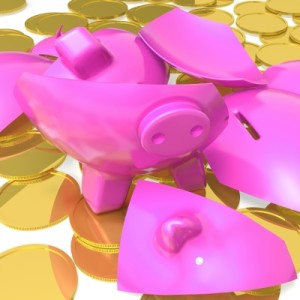There are a lot of myths and misconceptions around when it comes to your credit rating. Some people even still believe that there is a credit blacklist, which is most definitely not the case.
There is no question that hidden amongst a level of mild paranoia and genuine concern, there are certainly factors that will affect your ability to obtain credit. How you manage your bills will have a bearing on how well you score.
Credit scoring explained
The first thing to do is try and demystify credit scoring and explain its purpose in our financial lives.
If you apply for a loan, a mortgage, a credit card, mobile phone contract or any product or service that involves lending money to finance the purchase, you can expect the lender to run a credit check in order to predict how likely you are to repay the money they are letting you borrow.
They use one of the credit checking agencies in the UK that hold data on financial performance and electoral register records, such as Experian or Equifax, and you can access this information yourself to see what information they hold about you for a small fee.
You will probably be given a different credit rating by each of the credit reference agencies, as they all use their own systems to evaluate the information they have collated on you. The score they give you will change according to your financial status at the time.
This means that late payments on your credit cards and utility bills could affect your ability to get accepted for the loan or contract you are applying for, but it is wise to remember that credit scoring is about profit for the company, as well as assessing risk.
This also means that if you pay off your credit card balance every month, some lenders might not want you as a customer as you won’t earn them any money so even the most solvent of people can get rejected.
Late payments
Everyone makes mistakes and sometimes you might be late paying a bill or miss a payment due to explainable circumstances. So how do late payments affect your credit rating?
A late payment is never going to be a good thing to see on your credit file, but it will often be taken in context. So if you have a history of paying your bills promptly, one payment should not send your credit score into freefall.
But if you regularly miss payments, it can have a detrimental effect, as it means you are possibly a higher risk to lend to, or you may be struggling to meet your financial commitments due to being over-stretched.
Utility bills
Your credit file will not just reflect your payment performance on credit cards and loans; it will also contain information about non-debt accounts such as gas and electric bills.
Many people are struggling to cope with rising energy bills, and a smart move would be to check with an energy comparison website to see if you can get a cheaper deal elsewhere.
Your gas and electricity supplier will not regularly report your payment history on a monthly basis unless they have difficulties collecting a debt and have to issue a collection or default notice.
The credit report system certainly has its fair share of anomalies and you should check your file regularly to ensure that it contains no errors.
If you are a few days late paying a bill, your credit file should not be affected in any way, as a late payment flag should only be raised after at least 30 days after the due date. So the only penalty you might have to deal with is a late payment charge.
About the Author:
Scott Byrom is committed to helping consumers save money on their bills and regularly writes about money and bill management. Visit the www.ukpower.co.uk energy comparison site for more ideas.
CMO Contributor
Latest posts by CMO Contributor (see all)
- Can Blogger Mommies Stay on Top? 7 Ways to Get Your Blog on the Right Track - November 25, 2015
- Fitness Is a Family Affair: Tips for Raising Active Kids - June 3, 2015
- How to Become an Accountant - May 30, 2015




